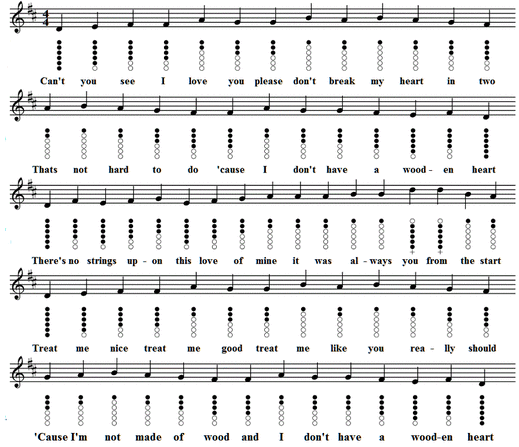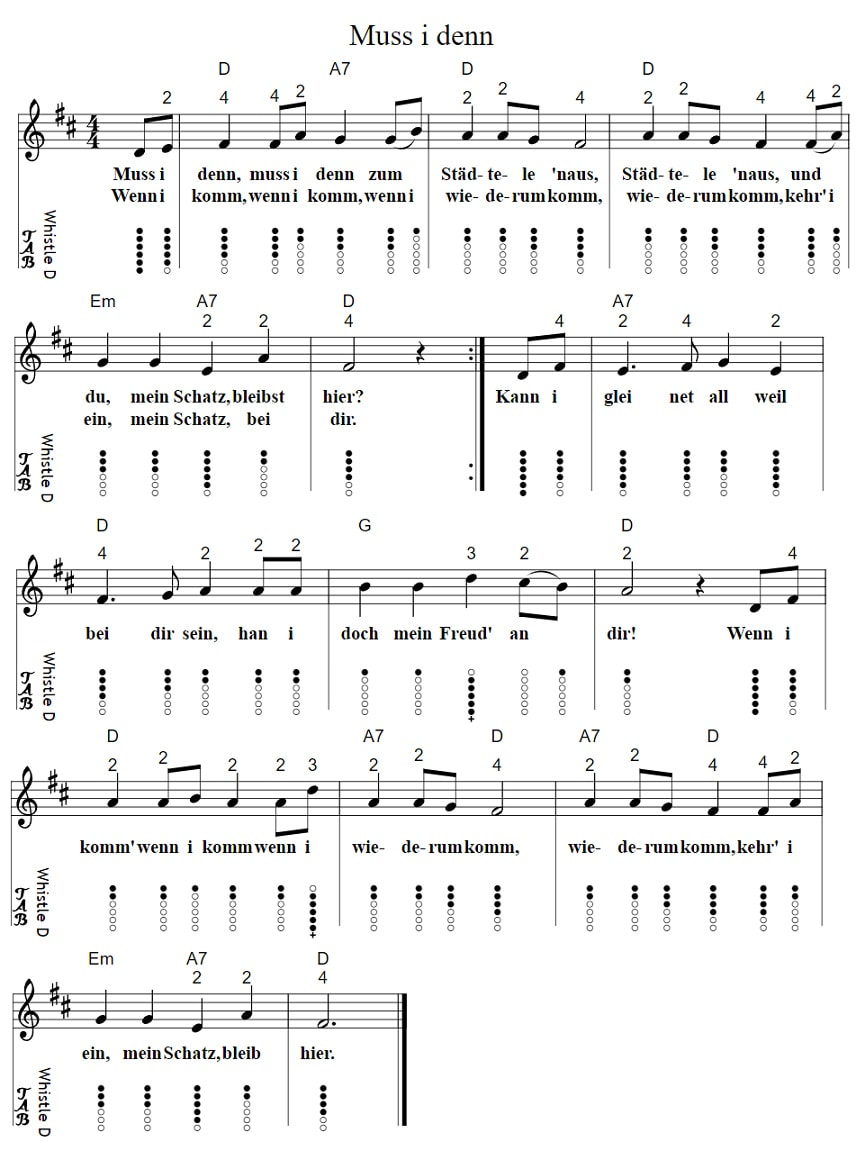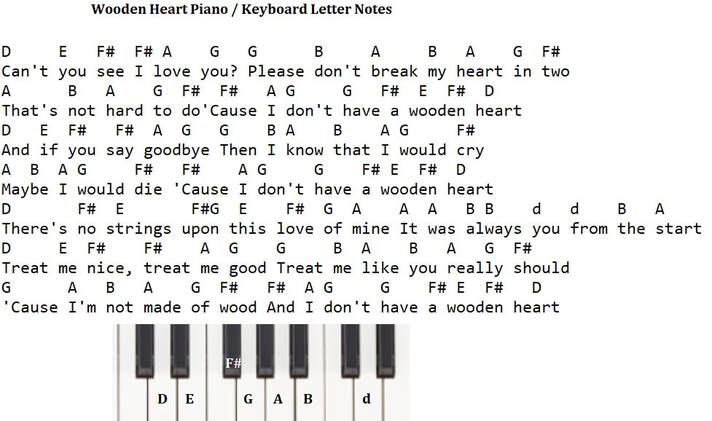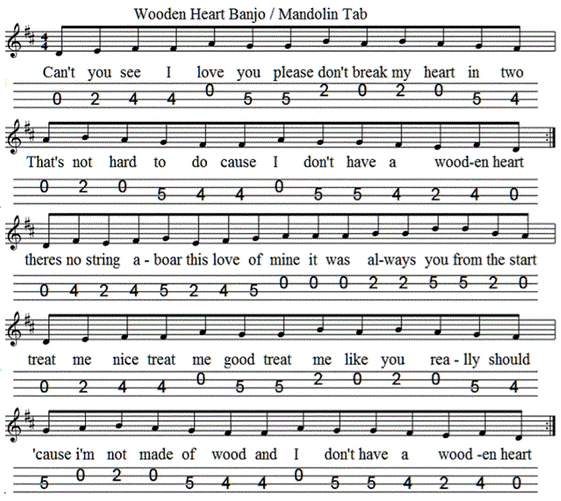Wooden Heart Tin Whistle Notes
The piano keyboard / melodica letter notes for Wooden Heart are included. These are the same as I play on the youtube video and the sheet music. You could use these same notes for any instrument including recorded, banjo and mandolin. This letter system for learning is the way many children are thought in schools. Back to the list of popular songs on tin whistle .The banjo / mandolin tab is included.Muss i denn original song in German sheet music tin whistle notes and chords included.
The Wooden Heart song, also known as 'Muss i denn,' is a German folk song that has captivated listeners for generations. Its enduring popularity can be attributed to its poignant lyrics, catchy melody, and cultural significance. This thesis will delve into the history of the Wooden Heart song, its cultural context, and its impact on music and society.
The Wooden Heart song was originally written by German composer Friedrich Silcher in the early 19th century. Silcher was inspired by the traditional Swabian folk tune 'Muss i denn zum Städtele hinaus' and adapted it into a new song with new lyrics. The song gained widespread popularity when it was published in 1827 and has since been translated into multiple languages, including English, French, and Spanish.
The lyrics of the Wooden Heart song tell a heart-wrenching tale of love and loss. The protagonist of the song is a young man who must leave his beloved hometown and his true love to pursue his dreams. He promises to return one day and asks his lover to keep his wooden heart safe until then. The song's emotional depth and relatable themes of love, longing, and separation have resonated with listeners for centuries.
The Wooden Heart song's popularity was further amplified when it was featured in the 1960 film 'G.I. Blues,' starring Elvis Presley. The song was translated into English by Fred Wise, Ben Weisman, Kay Twomey, and Bert Kaempfert for the film and was renamed 'Wooden Heart.' Presley's rendition of the song became a massive hit, reaching number one on the Billboard charts and solidifying the song's place in popular culture.
One of the reasons for the Wooden Heart song's enduring popularity is its cultural significance. The song is deeply rooted in German folk tradition and is often associated with the Swabian region. Its melancholic tone and nostalgic lyrics evoke a sense of longing for one's homeland and cultural heritage. The song has become a symbol of German identity and is often performed at cultural events, such as Oktoberfest and folk festivals, around the world.
The Wooden Heart song's impact on music and society can also be seen through its numerous covers and adaptations by artists from various genres. In addition to Presley's iconic version, the song has been recorded by artists such as Joe Dowell, Connie Francis, and The Beatles. The song's popularity has also led to its incorporation into other genres, including punk, rock, and electronic music. This demonstrates the song's versatility and its ability to transcend cultural and musical boundaries.
In conclusion, the Wooden Heart song is a timeless masterpiece that has stood the test of time. Its poignant lyrics, memorable melody, and cultural significance have captured the hearts of listeners worldwide. Its impact on music and society is undeniable, and it continues to be a source of inspiration for artists and a beloved piece of German cultural heritage. The Wooden Heart song is a testament to the enduring power of music to evoke emotions and connect people across cultures and generations.
The Wooden Heart song was originally written by German composer Friedrich Silcher in the early 19th century. Silcher was inspired by the traditional Swabian folk tune 'Muss i denn zum Städtele hinaus' and adapted it into a new song with new lyrics. The song gained widespread popularity when it was published in 1827 and has since been translated into multiple languages, including English, French, and Spanish.
The lyrics of the Wooden Heart song tell a heart-wrenching tale of love and loss. The protagonist of the song is a young man who must leave his beloved hometown and his true love to pursue his dreams. He promises to return one day and asks his lover to keep his wooden heart safe until then. The song's emotional depth and relatable themes of love, longing, and separation have resonated with listeners for centuries.
The Wooden Heart song's popularity was further amplified when it was featured in the 1960 film 'G.I. Blues,' starring Elvis Presley. The song was translated into English by Fred Wise, Ben Weisman, Kay Twomey, and Bert Kaempfert for the film and was renamed 'Wooden Heart.' Presley's rendition of the song became a massive hit, reaching number one on the Billboard charts and solidifying the song's place in popular culture.
One of the reasons for the Wooden Heart song's enduring popularity is its cultural significance. The song is deeply rooted in German folk tradition and is often associated with the Swabian region. Its melancholic tone and nostalgic lyrics evoke a sense of longing for one's homeland and cultural heritage. The song has become a symbol of German identity and is often performed at cultural events, such as Oktoberfest and folk festivals, around the world.
The Wooden Heart song's impact on music and society can also be seen through its numerous covers and adaptations by artists from various genres. In addition to Presley's iconic version, the song has been recorded by artists such as Joe Dowell, Connie Francis, and The Beatles. The song's popularity has also led to its incorporation into other genres, including punk, rock, and electronic music. This demonstrates the song's versatility and its ability to transcend cultural and musical boundaries.
In conclusion, the Wooden Heart song is a timeless masterpiece that has stood the test of time. Its poignant lyrics, memorable melody, and cultural significance have captured the hearts of listeners worldwide. Its impact on music and society is undeniable, and it continues to be a source of inspiration for artists and a beloved piece of German cultural heritage. The Wooden Heart song is a testament to the enduring power of music to evoke emotions and connect people across cultures and generations.
Muss i denn sheet music tin whistle notes and chords
Below is the list of sheet music and tin whistle songs that are in my ebooks. This is the largest collection of tin whistle songs ever put together.[over 800 songs ] Including folk, pop and trad tunes plus German And French songs along with Christmas Carols.
All of the sheet music tabs have been made as easy to play as was possible.
The price of the ebooks is €7.50
All of the sheet music tabs have been made as easy to play as was possible.
The price of the ebooks is €7.50
Wooden heart melodica / piano keyboard letter notes.
The easy to play letter notes for Wooden Heart.
The 2 notes marked in bold text are the high D's
D E F F A G, G B A B A G F
A B A G F, F A G G F E F D.
Repeat above.
D F E F G E F G A, A A B B D D B A
D E F F A G, G B A B A G F
A B A G F, F A G G F E F D
The 2 notes marked in bold text are the high D's
D E F F A G, G B A B A G F
A B A G F, F A G G F E F D.
Repeat above.
D F E F G E F G A, A A B B D D B A
D E F F A G, G B A B A G F
A B A G F, F A G G F E F D
And here's the banjo tab






